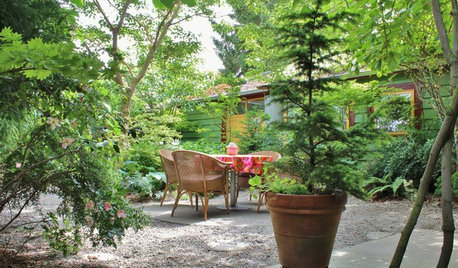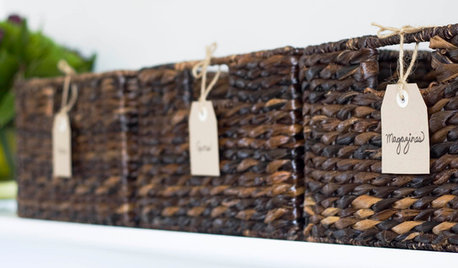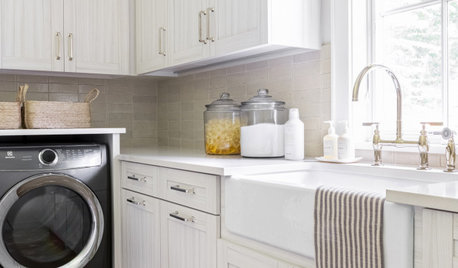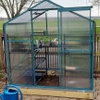middle of the road gardener/ organic/ non organic
marcantonio
8 years ago
Featured Answer
Comments (16)
lgteacher
8 years agoRelated Discussions
Old-time gardening = organic gardening?
Comments (23)To address paulns original propostion, I don't think it's a question that has a definitive answer without clarification.....what is "old-time gardening"? How far back does one go? And there are MANY definitions of organic gardening depending on one's philosophy, so which one are we going to agree to use? A lot of the previous comments are valid in a generalized form. The use of manufactured synthetic or chemically derived fertilizers has a pretty recent history when compared to how long man has been farming or growing crops for food. They are really only a by-product of the Industrial Revolution and the "hundreds of years" can actually be reduced to about 200, with the predominance of these fertilizers being widely accepted and used immediately after WWII, when they became cheaply and widely available, as greenwood85 notes. Same with synthetic, manufacture pesticides. And their introduction to the farming or gardening scene was considered at that time to be an enormous boon - a fast-acting, lightweight, easy to apply and easily accessible material that improved and increased harvests. Naturally - without the greater understanding we have now of soil science and the health implications of chemical residues and these products effects on pollution and ecology - they were widely accepted and utilized. It would be pretty hard to go back 50 or 60 years and not find a gardener or farmer that didn't use some form of manufactured fertilizer or pesticide. But even given these considerations, a good many of those gardeners/farmers from previous generations still incorporated what might be best termed "natural gardening" practices - composting, using animal manures, companion plantings, rotational cropping, home remedies for insect and disease controls - along with the manufactured products that at the time seemed like such a great improvement on what they had been doing. And affluence and location played a role as well - poorer farmers in more remote locations tended to use more what they had on hand - the natural methods and products rather than the newer, costly and more difficult to obtain manufactured ones. So I believe it is difficult to make a direct correlation between "old time gardening" and the organic or natural way unless you are going back more than just a 100 years or so....See MoreOrganic Seeds Vs Non Organic
Comments (23)There actually are some gmo seeds on the market that consumers can buy. According to Fedco ( where I get most my seed) Burpee golden beet is a Gmo? I have been growing that for years not knowing. It's germination and growth rate was slow. I now use detroit golden and golden mangel an heirloom seed. I cannot imagine that using treated seed has a noticable impact on the soil or the plant it produces. It's a religion, like Mac vs Pc. and organic is the pasword these days. I grow my stuff organically because I get free manure and I like what it does to my otherwise marginal soil. I also don't like handling chemicals and spraying them on the food I eat or give away. I use neam oil for aphids and it works ok, nothing for root maggots, just plant a few extra plants for the bugs etc. I have less than an acre in cultivation so managment is fairly easy. I also grow under various types of mulch, a winner all the way from my way of thinking. I had the opportunity to chat with a fellow that travels the world resurecting sick forests with proprietary enzymes he has created. He also tests soil and vegitbles with frequency devices he created in his labs to determine health. A healthy vegitable will sit on your kitchen counter for a long time and dehydrate, an imballanced one will rot fairly fast. It was indicated to me that some of the worst vegitable frequencies come from all chemical fertilized and all organically fertilized gardens and the combination of the two fertilezers produced the best produce, for what is is worth. The debate is likely to go on for some time....See MoreOrganic vs. non-organic growing
Comments (12)A lot of people might use organic methods but live right on top of large farms that use lots of chemicals so these chemicals are within an 1/8 mile or less. I believe as this is just my opinion that this negates any claims that their stuff is chemical free. Runoff is water from rain and melted snow which is not absorbed and captured by the soil, but runs over the ground and in and out of loose soil. Farm runoff is water leaving farm fields because of rain - melted snow - or possibly irrigation methods. As runoff moves, it picks up and carries pollution, which it can deposit into rivers,small ponds, lakes, coastal waters, and underground sources of drinking water. Agricultural runoff include,s pollution from soil erosion, livestock feeding systems, grazing, plowing, animal waste, and herbicides-pesticides, irrigation water, and fertilizer. Pollutants from farming include soil particles, pesticides, herbicides, heavy metals, salts, and nutrients such as excessive nitrogen - phosphorus. Large levels of nitrates from fertilizers in the runoff can infiltrate drinking water I wonder if these so-called organic method gardeners that say they are chemical-free explain this to their customers. All certified organic growers are the proper distance away from farm fields that use lots of different chemicals to prevent cross contamination or at least they should be. When I choose to grow produce for sale I do not mention anything even close to the word organic because I am NOT certified and tested and inspected and licensed ORGANIC If people ask me what chemicals I use for my operation they get all of my information. If they don,t ask I do not say anything because the weed/bug sprays that I use are available over the counter and are legal to use without special fed, or county-govt. permits. Nick...See MoreObjective Proof for Organic vs. Non-organic?
Comments (11)LOL. Here's a couple things that help. First, cut a clove of garlic into slices and let him stand on them barefoot for a few minutes until he tastes garlic. Yeah - you absorb stuff through your feets ;-) The A in MSMA is arsenic. ...great stuff to absorb. I'm 'quiet' about my natural gardening. Nobody likes a lecture and nobody likes self-righteous a-holes. Rather than 'FINE! Use chemicals! Kill our beloved Earth Mother you warming denier SOB!' you may find that the best 'argument' is to kick the ever loving humanure out of your neighbor's property by having a better looking lawn. When I moved into my current property a year ago I noted that there was a 'competiton' for best lawn going on between the guy across the street from me and the guy next to me. They giggled when I scalped my lawn and started spreading compost because I went from 'a nice chem lawn' to utter crap in days but a month later they were asking what the hell I did and this spring one of them tore out half his front yard and put down new sod because my impossibly thick, dark green, 3/8" tall bermuda 'carpet' was just killing him. ...I don't preach or gloat, I show and tell and explain pragmatically and sensibly and avoid any sort of judgment. ...and OK, OK, I sneak out with my pump sprayer each night and apply that day's gallon of liquid gold to the grass with an ounce of molasses and a gallon of water and I never reveal that part of it because too many fools have no understanding that liquid gold is not the least bit unsanitary and would freak out but the proof is right out front ;-) Had a funny one last week. Some service came by to pitch their spray program as three of us neighbors were doing what men do - chatting about the finer points of lawn care and beer and football. I actually felt bad for the pitcher because we were in front of my house and the guy had really picked the wrong place to pitch. "We fertilize regularly" - hmmmm... is my yard in need of fertilizer? (lawn is pine green, thick and lush). "We treat for broadleaf weeds and crabgrass!" Oh really" How? "We spray the entire yard" Hmmmm.... ok, but there aren't any weeds or crabgrass, doesn't that stuff knock the grass back a bit? What's in it - can I walk barefoot after you spray it? "we also spray for insects so you won't have any ants and spiders". Oh... other than the occasional black widows which don't live in the lawn, why is it good to kill spiders? Does the spray kill only the spiders and ants? What about ladybugs and flutterbys? My kid likes ladybugs and running through the yard barefoot. Would it be OK to run around barefoot after you spray? Poor kid. I looked at him and said "OK, so you want to spray several gallons of poison to kill weeds that are not present and insects that are harmless for $500 and the benefit to me is that I can't run around in the yard barefoot with my toddler? No offense man but how does that sound like a good idea?" I was nice about it but the lack of sales training was probably more annoying to me than the lack of cognition. If I had to sell a used Pinto I would probably not try to sell it at a Mercedes dealership and that's what this kid was trying to do. Worse - the neighbors were asking me how to get the same benefits without the negatives and cost. That's how we win the debate and the key is not to over-reach. If someone asks me how to kill Nutsedge without chemicals I don't BS them. I pull the stuff until it eventually stops coming back. The best advertising we can do is to show results and avoid recommending anything that is iffy. I've read about how Nutsedge hates a good organic yard and that is just plain ...compost nitrogen of bovine origin. If someone WANTS to go all natural then they will. The other 90% want something that works so pick our battles wisely. Rather than spray 1/4 acre with a quart of MSMA maybe you can help a neighbor see the wisdom of using one ounce in his sprayer to spot treat. Rather than spraying the whole yard for insects (God that is freaking moronic) how about a spoonful of fire ant bait right on the mound? If we push hard to get people to go 100% natural we will fight like hell to win over 10-20% of those we argue with. If we are pragmatic rather than dogmatic we can probably get 80% of people to use only 20% of the bad crap they use currently and that has a MUCH greater impact. 32 ounces of MSMA targeted where indicated across 32 lawns is better than half of those lawns getting a full 32 ounces, right? Progress, not perfection. Show, then tell. Who do you listen to? The guy who is kicking your ass at something to the point where you break down and ask him how he does it or the guy who tells you what you are doing wrong without first having shown you a reason to believe he knows his ass from his elbow?...See More- marcantonio thanked daninthedirt (USDA 9a, HZ9, CentTX, Sunset z30, Cfa)
rgreen48
8 years agolast modified: 8 years agomarcantonio
8 years agoSeysonn_ 8a-NC/HZ-7
8 years agorgreen48
8 years agolast modified: 8 years agoPupillaCharites
8 years agolast modified: 8 years agodigdirt2
8 years agoGardenDan 6a
8 years agolast modified: 8 years agomarcantonio
8 years agoSeysonn_ 8a-NC/HZ-7
8 years agoPeter (6b SE NY)
8 years agolgteacher
8 years agoPeter (6b SE NY)
8 years ago
Related Stories

INSPIRING GARDENSFrom Concrete Lot to Gracious Organic Garden in Seattle
Plants, pests and even weeds have a place in this landscape, which offers an edible bounty and a feast for the eyes
Full Story
GARDENING GUIDESHow to Switch to an Organic Landscape Plan
Ditch the chemicals for a naturally beautiful lawn and garden, using living fertilizers and other nontoxic treatments
Full Story
HOUSEKEEPING7-Day Plan: Get a Spotless, Beautifully Organized Garage
Stop fearing that dirty dumping ground and start using it as the streamlined garage you’ve been wanting
Full Story
ORGANIZING21 Tips for Organizing Your Stuff
Restore order at home with these ideas for tidying up cupboards, shelves, doors and more
Full Story
ORGANIZINGGet Organized: Are You a Piler or a Filer?
Tote out the bins and baskets and learn how to be an organized piler if file cabinets leave you cringing
Full Story
ORGANIZINGYour Total Home Organizing and Decluttering Guide
Take it slow or be a speed demon — this room-by-room approach to organizing and storage will get your home in shape no matter how you roll
Full Story
LAUNDRY ROOMS7-Day Plan: Get a Spotless, Beautifully Organized Laundry Room
Get your laundry area in shape to make washday more pleasant and convenient
Full Story
BATHROOM DESIGNThe Family Home: 8 Easy Tips for an Organized Bathroom
If your bathroom has that hit-by-a-hurricane look that tends to come with kids, sort things out with these tried and true ideas
Full Story
ORGANIZING7-Day Plan: Get a Spotless, Beautifully Organized Kitchen
Our weeklong plan will help you get your kitchen spick-and-span from top to bottom
Full Story
THE ART OF ARCHITECTUREWhat Is Organic Architecture, Anyway?
Practitioners of organic architecture seek to connect houses more closely with their natural surroundings. Here's how they do it
Full Story



lindalana 5b Chicago